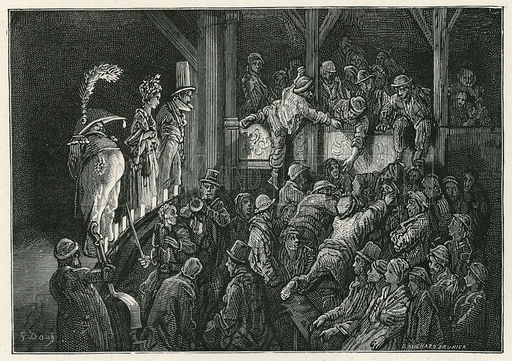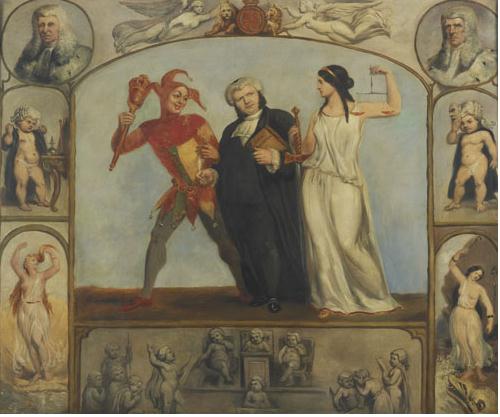A ribald, rollicking historical treat for you this week, as Mr Slang brings to vivid life the world of the ‘penny gaff’ theatres of London…
It is impossible to contemplate the ignorance and immorality of so numerous a class as that of the costermongers, without wishing to discover the cause of their degradation. Let any one curious on this point visit one of these penny shows, and he will wonder that any trace of virtue and honesty should remain among the people. Here the stage, instead of being the means for illustrating a moral precept, is turned into a platform to teach the cruelest debauchery. The audience is usually composed of children so young, that these dens become the school-rooms where the guiding morals of a life are picked up; and so precocious are the little things, that the girl of nine will, from constant attendance at such places, have learnt to understand the filthiest sayings, and laugh at them as loudly as the grown-up lads around her.
The pioneer sociologist Henry Mayhew, who thus attacked the cheap theatre, the ‘penny gaff’, duly essayed the social depths for his readers but always infused his findings with his own morality. He had started Punch to counter what he saw as the excesses of contemporary satirical papers, and in time would decry the ‘penny dreadfuls’ so beloved of the youthful working class. Mayhew’s morals reflected his society. Perhaps not every piano leg was clad in modest cloth, perhaps such euphemisms as ‘inexpressibles’ and ‘unmentionables’ for trousers were at heart a joke, and a chicken’s breast was just that, and not delicately euphemised as ‘white meat’, but there had been since the 1790s a movement towards greater propriety. To an extent this can be attributed to the growing scourge of evangelism, but the middle classes, religious or not, had come increasingly to identify the poor, already subject to real dirt, with its metaphorical variety. Coincident with which was ‘bad language’, a concept that was first recorded in the sense of ‘obscenity’ in 1798.
Much of the so-called obscenity came in the form of the double entendre. Try as one might there are only so many sex-related bodily functions (a list augmented by those linked to defecation) and only so many ‘official dirty words’ to describe them. Among the songs that Mayhew deplored was
one written about “Pine-apple rock,” [which] was the grand treat of the night, and offered greater scope to the rhyming powers of the author than any of the others. In this, not a single chance had been missed; ingenuity had been exerted to its utmost lest an obscene thought should be passed by, and it was absolutely awful to behold the relish with which the young ones jumped to the hideous meaning of the verses.
There were many such songs, often sold in small booklets at sixpence a time. Mayhew does not mention encountering them in the gaffs, but they were on sale in such places as the Coal Hole or the Cider Cellars– down-market taverns around Covent Garden where singers would keep it clean until midnight and then render it increasingly filthy thereafter. Typical songbooks included The Delicious Chanter (1834), The Flash Chaunter (1834), The Frisky Vocalist (1836), The Gentleman’s Spicey Songster (1841) and The Icky-Wickey Songster (1837). They were published in London and Edinburgh and Dublin and across the Atlantic in New York; the earliest appeared in the 1770s, the last around 1865.
Their main publisher was the theatrical printseller, William West, of 57 Wych Street, Strand, not far from the pornography centre of Holywell Street. Mayhew interviewed Wych, who had pioneered the popular toy theatres (‘penny plain and twopence coloured’) but they did not discuss this side of his trade.
Most songs depended on a ‘knowing’ audience, i.e. that which appreciated the double entendres of ‘He’ll No More Grind Again’, ‘I Am a Smutty Chimney Sweep’ (When up the ladies’ flues I creep, / The pleasure it is all my own) and ‘Rory O’More Had A Hell Of A Bore’ (I’m the boy your touch holes to prime; / I never miss fire, or flash in the pan, / When I go shooting it is not my plan.’) And that ever-popular duo ‘Job Halls & Mike Hunt’. Thus a louche guidebook, The Swell’s Night Out (1841), noted of one dive that: ‘The dance was followed by an out-and-out song by Mike Hunt, whose name was called out in a way that must not be mentioned to ears polite.’
Not everyone appreciated the entertainment. Thackeray’s fictitious Colonel Newcome had ‘brought his young son in the expectation of enjoying an evening of glee singing and old English ballads, but when later in the evening Captain Costigan rose to his feet and gave voice to a song, it so offended the worthy Colonel that he called for silence. When some in the room urged the singer to go on, the Colonel retorted, ‘Does any gentleman say “Go on”? Does any man who has a wife and sisters, or children at home, say””Go on” to such disgusting ribaldry as this? Do you dare, sir, to call yourself a gentleman, and to say that you hold the king’s commission, and to sit down amongst Christians and men of honour, and defile the ears of young boys with this wicked balderdash?’ ‘Why do you bring young boys here, old boy?’ cried one of the diners.’ Why indeed? The Colonel and his son departed.
But most of the audience knew what they were in for. And these fans of bawdy were equally likely to have made up the audience at at another highly popular mid-century entertainment: the ribald, sex-obsessed ‘Judge and Jury Shows’ (based at the Coal Hole but occasionally touring the provinces) of Renton Nicholson [pictured above]. These ‘trials’, with Nicholson playing a very straight judge, re-enacted well-known divorce cases, with popular celebrities, politicians and practising lawyers on the ‘jury’ and men in drag playing the women. There was much opportunity for lubricious description. Nicholson himself (1809-61) was something of a Paul Raymond in embryo, an entrepreneur of public sexuality, who rose from running a cigar shop with liquor and cards in the back room to offering not just the ‘Judge and Jury’ shows, but briefly (and unsuccessfully) owning the Cremorne pleasure gardens (roundly condemned as a venue of licensed immorality), editing the scandalous Town newspaper and presenting ‘poses plastiques’, i.e. nearly naked women who like those of London’s mid-20th century Windmill Theatre, attempted, in their immovable postures and supposedly classical interpretations, to counterfeit ‘art’.














Those who are intrigued by the ‘Judge and Jury Shows’ might like this, a typical Nicholson ad:
GARRICK’S HEAD AND TOWN HOTEL, BOW STREET, COVENT GARDEN. Gentlemen visiting London will do themselves a moral wrong, and will merit the censure of their friends at home, if they go back to the provinces without being able to say to their inquiring connections that they have witnessed the extraordinary entertainments provided for the interlection of the convivial in the magnificent saloon of the above-named hotel. Monday night the Judge-and-Jury Society will hear a cause redolent of larkery after darkery, being the Queen on the prosecution of Scard against Pakenos. Tuesday and Wednesday the concert. Thursday the Judge-and-Jury Society will sit again to decide a most important case of breach of promise of marriage, ‘Hitchon v. Rogers.’ Friday the concert. Saturday (Oh! Such a night!) the Judge-and-Jury Society will wind up the week with a serious, momentous and straddling case of crim. con., being the affair lately so much whispered about of the Hon. Viscount Limpus v. The Hon. Powderham Pelter Plantaganet Priapus Pulverton. In this cause it is anticipated that several men of fashion and ladies in their own right will be examined. Mr Bosanquet Thesiger, Mr Mansfied and Thurlo Pipps are retained for the Plaintiff, and the double of Lord Brougham and Mr Coke Tenterden Phunk will appear for the Defendant. Mastication and Apollo [i.e. food and music and/or singing (in Roman mythology Apollo was the god of music)] every night after the theatres. Repose and matin feed [i.e bed and breakfast] half-a-crown,” etc.
Brilliant history writing..Sounds like a riot, that Judge and Jury show.
I’d give a lot to be able to time-travel back to one of those penny gaffs (though once would probably be enough).
I reckon the smell alone would be enough. But yeah, give me access to a time machine and I’d be off for a dirty weekend in the 1860s before you can say bushel bubby.
I should have known better than to think that Mr M Hunt first appeared in Porkies!
http://www.youtube.com/watch?v=ghsuk6GiEN8
How did gaff come to mean the place you live (but only in London it seems to me)?
Gaff starts of as Romani gav, a (small) town. Senses developed: 1. a fair. 2. a cheap music hall / theatre. 3. a show, an exhibition. 4. a brothel. 5. a prison. 6 a place or area, e.g. a street. 7. a warehouse. 8. a job. 9. a house, shop or home. 10. a dance hall. 11. a place selected for a robbery. 12. a crooked casino or anywhere else that fleeces the sucker. 13. a hotel. 14. a bar. 15. a restauramt. 16. a club